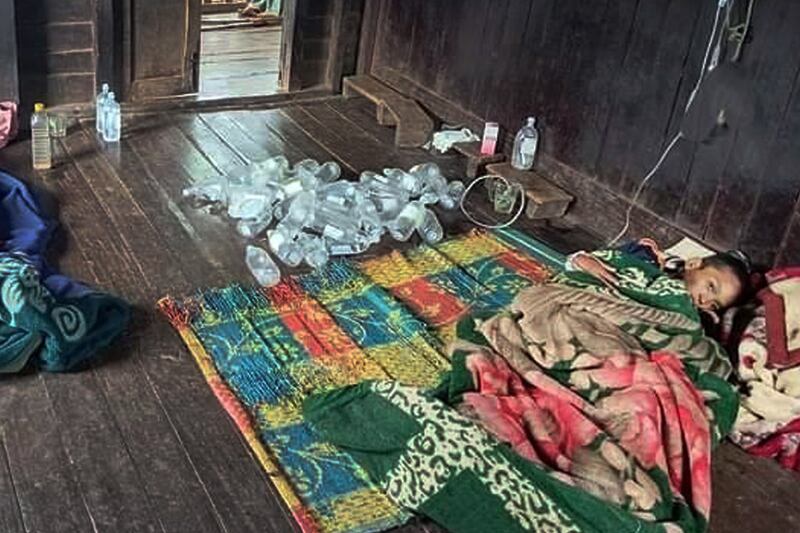Read RFA coverage of this story in Burmese.
Junta restrictions on the transport of medicine in Myanmar’s war-torn regions of Rakhine, Chin and Sagaing in the north and west have led to shortages for displaced civilians dealing with outbreaks of disease, sources told RFA Burmese.
The restrictions are the latest attempt by the junta to keep medical supplies from reaching rebel groups it has been fighting since the military seized power in a February 2021 coup d’etat.
But rights organizations said the transport ban largely hurts civilians who have fled conflict and likened it to a “war crime.”
Across the country, the civil war has left more than 3.5 million people displaced within Myanmar as of Feb. 17, the United Nations said.
More than 10,000 internally displaced persons, or IDPs, are suffering from diarrhea and skin diseases in the southern part of Sagaing region’s Kalay township alone, a person who fled fighting in the area told RFA Burmese on Monday.
The person said that the conditions are largely due to contaminated water and people “urgently need medicine.”
“Due to their poor and unhygienic living conditions, IDPs are highly vulnerable to seasonal diseases,” said the source who, like others interviewed for this report, spoke on condition of anonymity due to security concerns. “The junta is the root cause of these health crises, as they have blocked and seized essential medical supplies to the conflict torn areas.”
More than 200 displaced people were suffering from diarrhea in early February, resulting in three deaths, residents of Kalay told RFA. Travel to three affected villages has been restricted, they said.
No capacity to treat serious diseases
Displaced people from Chin state’s Paletwa township, who are taking shelter in refugee camps across the border in India’s Mizoram state are also facing hardships due to a lack of medicine, a refugee told RFA.
“Most IDP camps along the border lack access to healthcare and urgently need medicine,” said the refugee, who also declined to be named. “As the number of displaced people continues to rise daily, the demand for medical supplies has also increased. Paletwa township is facing a severe shortage of essential medicines.”
Although medical teams and residents are providing public health care services in some areas of Chin state, they “lack the capacity to treat chronic and infectious diseases effectively,” he said.
RELATED STORIES
The secret jungle hospital where Myanmar’s rebels are treated
Freeze to US aid hits Cambodia, Laos and Myanmar hard
Junta blockades keep Myanmar children malnourished and without vaccines
The shortages have forced many residents of Chin to cross the border in search of hospitals in Mizoram, Salai Van Sui San, the deputy director of the Institute of Chin Affairs, told RFA.
“If a diarrhea outbreak occurs, it will quickly spread throughout an IDP camp,” he said. “With no access to medical treatment in these areas, residents rely on NGOs for healthcare services.”
Chronically ill ‘are dying’
The junta has also completely blocked the transportation of medicine in Rakhine state, residents said Monday, noting that patients returning to the state capital Sittwe after receiving treatment in Myanmar’s largest city Yangon are “only allowed to bring medicine prescribed by their doctor.”

“Due to restrictions on medical transportation, people with chronic illnesses are dying,” said Win Naing, a resident of Rakhine’s Maungdaw township. “Some medicines are imported into Rakhine state via routes from India and Bangladesh, but those in urgent need still face severe difficulties.”
A 10-tablet pack of paracetamol, used to treat fever and mild to moderate pain, now costs up to 5,000 kyats (US$2.40) in Rakhine state, he said — a 10-fold increase from before the coup.
Restricting medicine ‘is a war crime’
Salai Mang Hre Lian, the managing officer of the Chin Human Rights Organization, told RFA that the junta’s blocking of medical treatment amounts to a war crime.
“We’ve witnessed so many cases of denied medical treatment [since the coup], and we can say that the junta is bluntly violating our people’s right to life and committing war crimes,” he said.
Attempts by RFA to contact junta spokespersons Nyunt Win Aung for Sagaing region, Hla Thein for Rakhine state, and Aung Cho for Chin state for comment on the restrictions went unanswered Monday.
According to a Feb. 14 report by ReliefWeb, a group funded by the United Nations Office for the Coordination of Humanitarian Affairs that regularly publishes updates on humanitarian situations worldwide, nearly 140 health workers have been killed and approximately 840 arrested in Myanmar since the coup.
Translated by Aung Naing. Edited by Joshua Lipes and Malcolm Foster.
